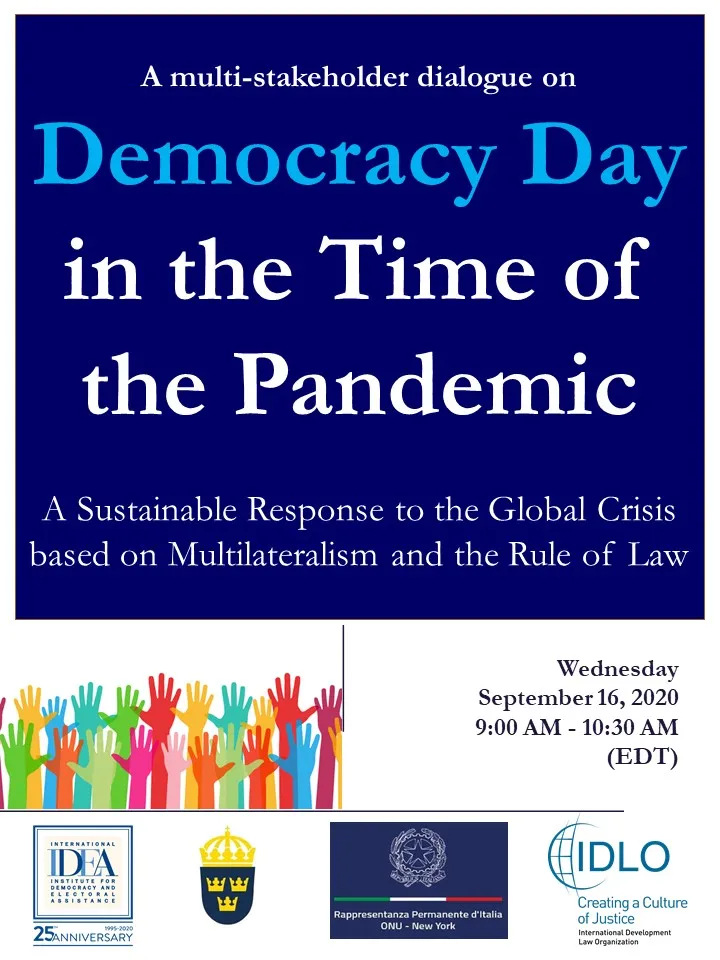Democracy Day in the Time of the Pandemic: A Sustainable Response to the Global Crisis based on Multilateralism and the Rule of Law

The International community reunited on 16 September 2020 to commemorate Democracy Day during a time of global crisis and uncertainty, reaffirming the key role of democratic institutions and the importance of protecting human rights. Today, in fact, is a pivotal moment for democracy, and while the pandemic has further exposed inequalities and aggravated life conditions of the most vulnerable, governments around the world have the great opportunity to learn and grow from this crisis in order to build a more sustainable type of democracy for the future.
In an official statement delivered on UN Democracy Day and screened at the event, UN Secretary-General Antonio Guterres highlighted the weight of democracy and the rule of law during the pandemic, and how the crisis is now particularly affecting certain countries where civic institutions and governments were already weakened. “The crisis is highlighting—and aggravating—long neglected injustices (…) and these inequalities are threats to democracy”. The Secretary-General encouraged governments to seize this pivotal moment and “build a more equal, inclusive and sustainable world, with full respect of human rights.”
International IDEA Secretary-General Kevin Casas-Zamora discussed the current situation and how democracy is at risk in many countries around the world, where leaders are facing stark challenges and where the pandemic has further revealed and uncovered underlying issues concerning democracy and civil rights. “Authoritarian leaders”, for example, “have tighten their regimes, and people have been deprived of some of their fundamental rights”. Behind the action of those leaders, there is an intention of shutting down critical political spaces and dialogues—the true nature of democracy. Minorities have been shut down and weakened, in an effort to diminish human rights and reinforce authoritarian power; the abuse of emergency powers and force, as well as military actions, have significantly increased across countries; individual privacy and access to free independent information is endangered—which is highly risky for a sustainable healthy democracy. “COVID-19 threatens the future of democracy”, added Secretary-General Casas-Zamora, “and now it’s time to globally protect it”.
In her video message to the event, UN High Commissioner for Human Rights Michelle Bachelet discussed how COVID-19 has endangered democracies and some personal freedoms in countries where public health has been used as an excuse, at times, to implement highly restrictive measures: “The press is crucial in maintaining democracy by informing the public”. By looking at how transparent governments can be and how they are able to balance their choices in the protection of human rights, we may now measure democratic institutions around the world. In that regard Ambassador Stefano Stefanile, Deputy Permanent Representative of Italy to the UN, reflected on the Italian case where tough lockdown measures were implemented by trying to strike a balance between public health priorities and the impact of COVID-19 on democracy, the rule of law and human rights: “Governments have to adopt extraordinary measures to safeguard public health, which can in contrast limit human rights”.
Ambassador Annika Ben David, Swedish Ambassador-at-large for Human Rights, Democracy and the Rule of Law, underscored that “without respect of human rights—there’s no rule of law. They are intertwined”. She mentioned Sweden as a “guide for democracy” and encouraged foreign policy action and research to strive for democracy and safeguard it. Despite the current circumstances, there needs to be accountability for the violation of human rights: “Democracy, human rights and the rule of law cannot be, ever, taken for granted”.
The impact that COVID-19 has on elections around the world is also very significant and at risk during our times. This is a stress-test for electoral systems, administration and processes, whereby tough decisions are taken on whether to hold elections, and how to maintain safety without compromising the integrity of the electoral process. However, using data and analysis, it is possible to provide policy recommendations and implement comprehensive plans that can safeguard and support this delicate process.
“How can we turn challenges into opportunities? (...) and how can we build a more resilient society today, so that we can recover and protect democracy and the rule of law in the future?” asked Jan Beagle, Director-General for International Development Law Organization (IDLO). This is the time for governments to reduce inequalities and protect vulnerable minorities who have been left behind—this is the only way to sustain the democracy.
Our governments now need to think out of the box and share the benefits of what they learn together. That is why the proliferation of global technology is currently so important and can really be the key to a new beginning. Innovation is key and governments should think about new policies without falling back into old, flawed systems.
A multilateral, integrated approach is what governments currently need. Civil society plays a central role for this global new chapter. Protecting democracy is of the essence to learn, improve and prevent the next global crises.
*To see the full video of the event, please click here.



